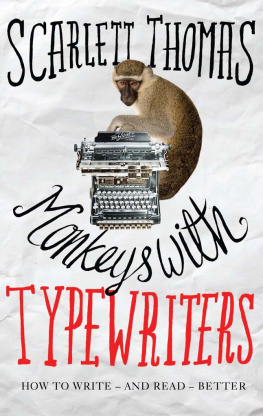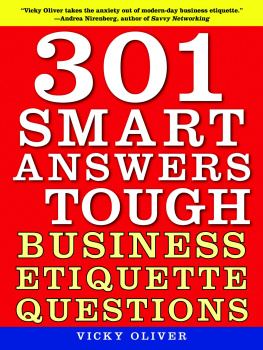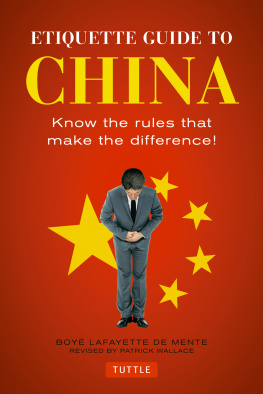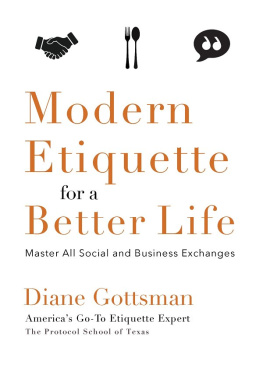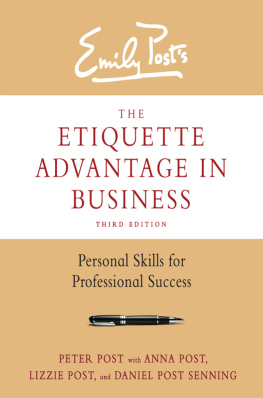Thank you for downloading this AMACOM eBook.
Sign up for our newsletter, AMACOM BookAlert , and receive special offers, access to free samples, and info on the latest new releases from AMACOM, the book publishing division of American Management Association.
To sign up, visit our website: www.amacombooks.org
To learn more about the American Management Association visit: www.amanet.org

The copyright information for this title may be found at the end of this eBook file.
excuse me
excuse me
THE SURVIVAL GUIDE TO
MODERN BUSINESS ETIQUETTE

Rosanne J. Thomas

FOR JEAN
contents
introduction
Growing up, I cannot recall ever hearing my parents mention etiquette. A fussy word that conjures up a certain level of affectation, it was likely not the first one that came to mind for my parents who were otherwise involved in the care, feeding, and general management of six children. Yet respectful behaviorthe actual manifestation of good etiquettewas indeed mentioned and modeled by my parents continually, and expected of us every day. Of course, being considerate of our siblings was not our first inclination. As kids vying for attention or the last piece of pie, sharing and waiting our turns were not second nature to us. But we did our best because we knew such behaviors were nonnegotiable.
In our family, manners lessons came in many forms. Our naval officer dad would often remind us to take all you want, but eat all you take (military-ese for not being greedy or wasteful) and not to short-stop (when passing food, not to help yourself first, especially if it is the last serving). Our high-school teacher mom let us know that the correct response when she called our names was Yes? not What?? She reminded us that please and thank you were not to be omitted and that arguing was a nonstarter.
One of my fondest childhood memories was of our mom and dad bravely piling us into our big station wagon on Friday nights and taking us to a local Italian restaurant for dinner. A huge treat for us, we were fully cognizant that any future excursions depended entirely upon how well we behaved. Since no one child dared jeopardize this for the rest, we rose to the occasion every time. And we learned how to twirl spaghetti in the process! We also learnedto our amazementthat this whole concept of showing good manners had an upside. Good things and ice cream came to those who were polite.
This trip down memory lane may evoke similar reminiscences from those who also came of age sometime in the 20th century. We remember when parents were shown respect simply because they were parents. We recall how family dinner was sacred: Everyone showed up on time, hands cleaned, and ready to participate in a family discussion. At these meals, children learned how to hold their forks and knives, how to speak when it was their turn, and how to listen when it was someone elses turn. Telephone calls were never taken. When outside the home, people dressed up for school, church, and travel; showed respect for authority; and with most audiences, generally kept their language profanity-free.
Much of what constituted respectful behavior a generation or two ago seems positively quaint by todays standards, with little relevance in the 21st century. Back then, parents were parents, and friends were friends, and never the twain did meet. Today, many parents are their childrens best friends, and vice versa. Then, showing respect for authority figures such as adults, teachers, and employers was simply done. Today, the very idea of authority is questioned. Then, sit-down meals were a nightly ritual. Today, coordinating schedules and dietary preferences to make such an event happen seems like far too much work.
In other ways, though, civility in the 21st century looks very much like it did before, even if its tenets are now applied in different ways. Today, we hear about the importance of authenticity and transparency. Back then, it was known as telling the truth. Today, teamwork is the mantra. Back then, you couldnt win a game of touch football without it. Today, organizations are embracing conversation cultures, as though conversing with colleagues is a new workplace invention. Last century, there were expectations of appropriate attire and behavior on the job. Today, there still are, even if they are defined in new ways.

Of course, much has changeddramatically. In the 20th century, questions about how to refer to a gay colleagues spouse, whether it was okay to text the boss at home over the weekend, or how to handle a checkered online past did not come up because the situations did not yet exist.
Add to this the generational challenge, as millennialsconsidered digital natives because they grew up with digital technologytry to work side by side with digital immigrants: traditionalists, baby boomers, and Gen Xers. These generations speak different languages, hold different values, and have different goals. Some say that because of the sheer number of millennials and their presumed influence, a new playbook for workplace behavior should be designed predominantly with this group in mind. But millennials are still outnumbered by the previous generations combined, and the previous generations are still mostly in charge. Gen Z is also coming up fast. Soon, there will be five generations needing to figure out how to work together.
In a workplace rife with opportunity for misunderstanding, people often do the wrong thing, at great expense to relationships and reputations. Workplace incivilityunintentional or sometimes deliberateis rampant. Nine out of 10 employees say they have experienced or witnessed incivility on the job. And its costly. Job stress, much of which stems from workplace incivility, costs U.S. corporations $300 billion a year.
How do employee populations come together with such disparate ways of looking at the work environment today? How are best behavioral practices identified to mitigate misunderstandings and ensure everyone feels understood and heard within a corporate culture? How do individuals and organizations burnish personal and company brands to position themselves most competitively in a fiercely competitive global arena? Its a tall order, but it can be done. It requires adoption of a new playbook for workplace behavior that respects the individual, which in turn paves the way for the greatest mutual success.
Excuse Me takes on this challenge. Incorporating dozens of real-life scenarios, hundreds of practical tips, valuable advice from those on the front line, and resources for additional information, Excuse Me explores what it takes to surviveand thrivein todays demanding global workplace. It takes a look at the root of workplace disrespect, from corporate cultures and the behaviors they allow to the uncertainty in interacting with coworkers of different genders, races, sexual orientations, cultures, physical abilities, and backgrounds.
A respectful workplace is a more pleasant workplace, and there are very real bottom-line advantages that accrue to organizations that uphold them. Eric Imparato, a principal at the accounting firm Wolf & Co., said, In a commodity marketplace, its easy to translate skills into shareholder value. People are differentiated by how they behave and can charge greater rates as a result.
Next page

